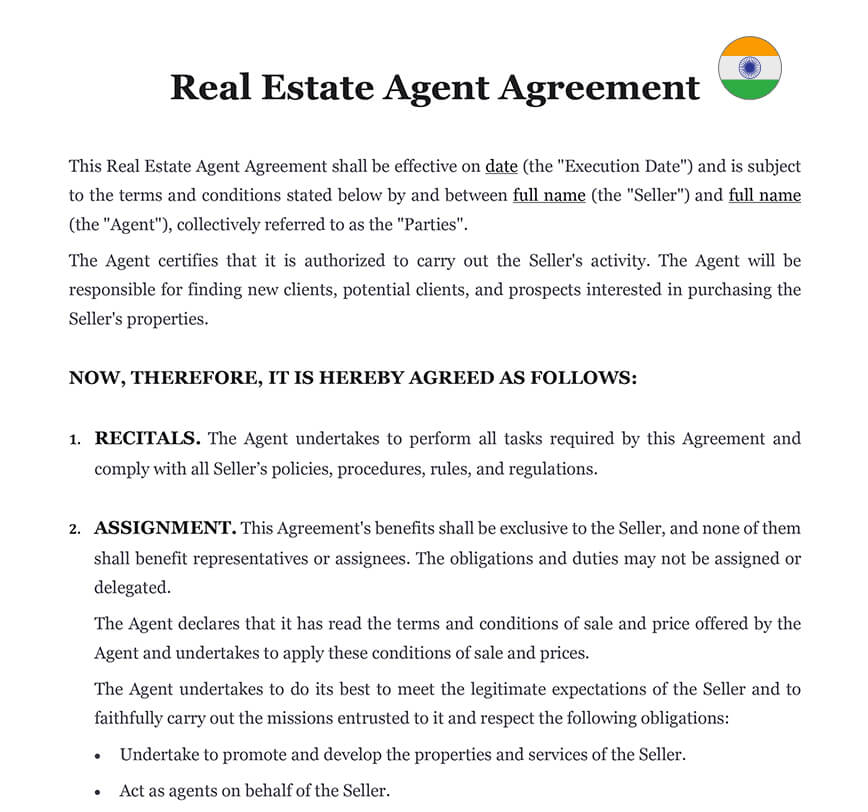Ready to use legal template
Drafted by experienced lawyers
Compliant with Indian law
Ready to use legal template
Drafted by lawyers
Compliant with Indian law
Home › Buy a property › Real estate agent agreement
Learn more about Real Estate Agent Agreement
A Real Estate Agent Agreement is a legally binding document that outlines the terms and conditions under which a property owner engages a real estate agent to buy, sell, or lease property. It clearly defines the scope of the agent’s responsibilities, commission structure, duration of the agreement, and other key obligations. In India, having a well-drafted Real Estate Agent Agreement helps avoid disputes, ensures transparency, and protects both the agent’s and the client’s interests in compliance with the Real Estate (Regulation and Development) Act, 2016 and other local laws. Download our Real Estate Agent Agreement available in an easy to edit Word format and drafted by expert to be used in India.
Table of contents
-
What is the purpose of the real estate agent?
-
What is the law applicable to real estate agent contracts?
-
What are the different types of contracts?
-
What are the essential elements of a real estate agent's contract?
-
What clauses secure the relationship between the client and the agent?
-
What are the causes of breach of contract?
What is the purpose of the real estate agent?
The agent can be independent or be mandated by a real estate agency to perform these services. It is essential to carefully choose the agent to whom the sale or purchase of a property will be entrusted. Indeed, his competences and his network will be determining to obtain the lowest or the highest possible purchase or sale price, depending on the case. Litigation related to the contract could also be avoided. Checking the reputation of real estate agents before entering into a contract is therefore mandatory.
What is the law applicable to real estate agent contracts?
The economy in the real estate sector is a major asset of India’s growth since it represents 8.5% of the territory’s GDP. Despite this, the country has long maintained a legal vacuum regarding the commercial relations between each actor in this field, due to the absence of special rules. The Indian legislator finally introduced the Real Estate Regulation Act in 2016 with the aim of regulating the real estate sector, which before this law was devoid of any control. The main motivation then was mainly the protection of buyers, but also of developers and real estate agents. Several compliance requirements are now imposed on key sectors of this economy.
In order to conclude Real Estate Contracts, the agent must be registered with the administration. However, this registration is not subject to any particular level of study or knowledge. Thus, any person can practice this profession. It is therefore important to make sure that the real estate agent chosen has had training in this field, or at least to find out about his reputation and results before committing to him. The non-compliance of the professional with these legal requirements engages his responsibility and can be condemned, according to sections 9 and 10 of the act to the payment of a fine of 10.000 rupees per day.
What are the different types of contracts?
Each client may have different expectations of their relationship with a real estate agent. It is therefore possible to tailor the contractual relationship and one’s obligations through a variety of agreements tailored to the client’s research.
Clients who do not wish to be bound exclusively to their real estate agent may choose to enter into an “open” contract, whereby the seller or buyer may decide to enter into other contracts with other real estate agents. In this case, the client is only obliged to pay the commission to the agent who has succeeded in concluding the relevant transaction.
On the contrary, an exclusive agreement grants the contracting agent an exclusive right to sell a property. He is the only agent who can carry out the operations aimed at the success of the planned transaction. In this case, the agent will receive his commission even if he is not at the origin of the sale, as long as the contract is valid. These are the contracts that are most commonly used in India.
What are the essential elements of a real estate agent's contract?
Like any contract, the real estate agent’s contract must first meet the formal requirements of the Indian Contract Act of 1872.
The contract must also include clauses which, although common to all agreements, are essential. In this sense, the contract must be clearly named at the outset, as must the personal details of the parties wishing to be bound by the obligations. Names, addresses, and any other relevant details should be specified. The roles of each party must be clearly defined. In the case of a Real Estate Contract, the clause should state that the client wishes to buy or sell a property, and that the agent will act as an intermediary in the management of this project. It is also essential to stipulate the payslip of the real estate agent, usually in the form of a percentage of the sale price obtained. In addition to the price of the service, the method of transaction between the parties can also be specified.
To avoid the possible leakage of confidential information shared between the parties, a confidentiality clause can be stipulated, preventing the co-contracting parties from revealing any information on future projects or transactions, but also on the financial situation of the client for example.
Finally, since any contractual relationship is uncertain, it is important to anticipate the occurrence of a dispute, and therefore its resolution. Such a clause provides for the way in which disputes will be settled. Generally, the preferred alternative to litigation in real estate contracts is arbitration, which is governed in India by the Arbitration and Conciliation Act of 1996. However, it will be necessary to specify to which law the contract is subject, in this case the Indian law.
What clauses secure the relationship between the client and the agent?
In addition to the clauses that are essential to any agreement, the real estate agent’s contract requires several specifications in order to be fully secure for both parties.
A clause recalling the law applicable to the contractual relationship must be inserted. This clause ensures that the agent will carry out the acts entrusted to him in accordance with the legal constraints imposed by the Real Estate Regulation Act of 2016, and certifies that he is registered in this capacity.
The professional shall clearly stipulate the services provided to the client. The real estate agent will then use his knowledge and implement all means in his power to find a buyer or a property corresponding to the client’s search as the case may be, and notify the co-contractor in cases where he receives a purchase offer from a third party. If the object of the contract is the sale of a property, information about the property such as its location, age, identification number if it exists, surface area or estimated value, should be specified.
It is possible that an unscrupulous client, once the agent has done his job of finding a third party interested in purchasing his property, may be tempted to contact the person directly without calling the agent in order to avoid paying the agreed commission. To prevent such an act, the agent will have to stipulate in the agreement a no-circumvention clause to preserve his remuneration. By this clause, the client undertakes not to deal with or solicit a buyer or seller initially brought in by the agent, with the aim of circumventing his commitments.
If the contract is exclusive, insofar as it prohibits the client from calling upon the services of another agent, an exclusivity clause must specify this. This will give the agent the quality of a unique interlocutor in the realization of the real estate transaction. This is generally the first choice of professionals, even if other types of agreements can be concluded.
What are the causes of breach of contract?
Breach of such an agreement may occur in several ways. On the part of the client, the fault may arise from his inability to honour the agent’s commission within the agreed timeframe, or to pay it in full. In the case of an exclusive contract concluded with an agent, the breach of the terms of the agreement may be characterized if the client uses another professional.
On the real estate agent’s side, a breach of agreement may occur if the agent does not take all reasonable steps to fulfill his or her mission. For example, the failure to keep the client informed of the arrival of new offers to purchase or to publish any advertisement presenting the property to be sold may constitute just cause for the agent to be held liable. The client could then obtain financial compensation for the damage suffered on this basis. The amount of the compensation will be calculated according to the terms and conditions of the contract and the market value of the property.
In tort, real estate agent fraud is characterized when the agent intentionally withholds important information about a property, or gives erroneous information in order to mislead the client. For example, it is a fraud for a real estate agent who has been mandated by his client to search for a property of a specific size, to modify the documents on a property in order to make it correspond to the client’s expectations, when in fact it does not correspond.
Any person aggrieved by the actions of a real estate agent can then file a complaint with the Real Estate Regulatory Authority (RERA), according to Section 31 of the RERA Act. Prior to 2016, this option was not available to the client, who then had to file a lawsuit in court.
Alternatively, a complaint may be filed under the Consumer Protection Act of 2019. However, this avenue of action is limited to those acting as a consumer in the contractual relationship. Therefore, the remedy is not available to persons acting in a professional capacity, for commercial purposes (such as purchase and resale for example). The client must be a consumer as defined in section 7 of the law, and therefore have contracted to purchase a house for personal use.
Disputes can also be resolved in the Indian courts, in the District Court or High Court, to obtain compensation for damages.
Real Estate Agent AgreementTemplate (.docx)
Save on attorney fees
310 client reviews (4.8/5) ⭐⭐⭐⭐⭐
Share information
Why Themis Partner ?
Make documents forhundreds of purposes
Hundreds of documents
Instant access to our entire library of documents for India.
24/7 legal support
Free legal advice from our network of qualified lawyers.
Easily customized
Editable Word documents, unlimited revisions and copies.
Legal and Reliable
Documents written by lawyers that you can use with confidence.




